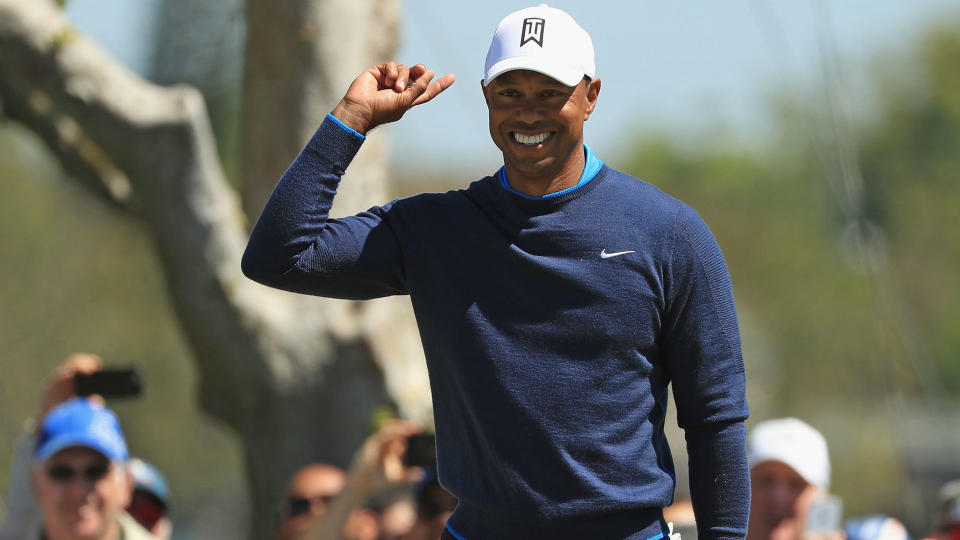The Tiger Woods Economy is real
The presence of Tiger Woods on the leaderboard last Sunday made the Valspar Championship, a PGA Tour event sandwiched between the WGC Mexico and the Arnold Palmer Invitational and usually ignored, a smash ratings hit.
More people watched the final round of the Valspar than watched the final round of the US Open, British Open, or PGA Championship in 2016 or 2017. Only The Masters got bigger numbers in the last two years—so you can imagine how well this year’s Masters will do with Woods in play.
And the Tiger Effect doesn’t only boost television ratings.
On Sunday of the Valspar, a Reddit user posted, “I work as a bartender at a golf course… I was so slam packed with people watching Tiger play it was insane. I know it seems minimal but the economic trickle down effect this guy has when it comes to the golf world is hard to explain. I made at least 3X the amount of money I usually make on Sundays just because Tiger was in contention.”

The wide-reaching economic impact Woods brings may be hard to explain, and it’s certainly also hard to quantify.
What we do know is that today’s pro golfers largely have Woods to thank for tournament prize purses doubling after he brought millions of new eyeballs to the sport in his prime; we know that Nike Golf built its business on his shoulders—the company was the one big sponsor that stuck by him through his entire public infidelity scandal; we know that Bridgestone Golf, which recently signed Woods to a ball deal, is reveling in the exposure and attention, and that its CEO argues that Woods “transcends” his sport a la Muhammad Ali and Michael Jordan.
But the anecdotal evidence of The Tiger Economy is popping up in many less obvious places over the last week, in sports beyond golf. (The golfer’s broad impact was the topic of the latest Yahoo Finance Sportsbook podcast.)
Everyone in every sport is watching Woods. Consider again the 5.11 overnight rating of the final round of the Valspar, and consider that it happened on NCAA Selection Sunday. Sports fans were more interested in Woods than in seeing the reveal of the March Madness bracket.
UNC basketball coach Roy Williams, in his press conference before the start of the tournament, opened by saying, “My opening statement would be: I see that Tiger Woods just birdied a hole, so he’s the sole leader now at 4 under par through 16 holes. That’s all I got.”
Roy Williams: BIG Tiger Woods guy. pic.twitter.com/nf5iVYeG3U
— Dean Straka (@dwstraka49) March 15, 2018
Multiple popular Twitter accounts now follow the golfer’s every move—on and off the green, even down to what he eats during play.
GC Tiger Tracker, to name just one example, has more than 200,000 followers. Another tracker account, TW Spot, got suddenly suspended on Thursday, and bereft fans wanted answers.
Sliders grilling up next to 12 tee. Tiger grabs one, then goes back for another. Better than a Yelp review. pic.twitter.com/SOxGMWMQgB
— Tiger Tracker (@GCTigerTracker) March 7, 2018
Fox Sports pundit Nick Wright says we are witnessing, “a sport coming back into existence.” And indeed, while much has been made about today’s young golf stars like Dustin Johnson, Rory McIlroy and Jordan Spieth, make no mistake: the game is in decline. Rounds of golf played in the U.S. have flagged, equipment sales have plummeted—it’s why Nike and Adidas both exited the golf club business last year.
But the Tiger Woods comeback, and its economic impact, has the instant potential to revitalize the sport. As long as it lasts.
—
Daniel Roberts is the sports business writer at Yahoo Finance. Follow him on Twitter at @readDanwrite.
Read more:
Tiger Woods brings record TV ratings to the Valspar tournament
Bridgestone Golf CEO: Tiger Woods ‘transcends’ golf
Tiger Woods comeback begins with Bridgestone ball deal
Trump’s presidency creates an unprecedented conflict for golf

 Yahoo Finance
Yahoo Finance 
